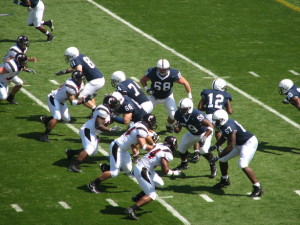August 8, 2017
 Maine recently joined the growing list of states (now 15) to legalize fantasy sports by enacting its own legislation that will expressly sanction and regulate fantasy sports contests and their operators within the State.
Maine recently joined the growing list of states (now 15) to legalize fantasy sports by enacting its own legislation that will expressly sanction and regulate fantasy sports contests and their operators within the State.
What are some key provisions of Maine’s fantasy sports regulatory scheme?
The regulations contained within Maine’s fantasy sports law track closely those of other states that have recently sought to regulate this space and include, but are not limited to, the following:
- Licensure requirements with annual fees up to $2,500;
- Prevention of employees and their relatives from participating in contests and sharing confidential information with third parties;
- Prohibition on offering contests that incorporate collegiate or amateur sporting events;
- Requirements that operators verify that participants are at least 18 years of age;
- Disclosure of the number of entries that a participant may submit to a single contest and taking steps to prevent a participant from exceeding that number;
- Clearly identifying highly-experienced participants by means of a symbol or other identifier;
- Prohibition on the use of scripts;
- Advertising restrictions that prohibit materials that target minors or otherwise include inaccurate or misleading statements; and
- Requirements that operators contract with third parties to conduct annual audits.
The law is operator-friendly for several reasons, including:
- A one-time application fee limited to the projected cost of application processing;
- No license fees for operators that had gross revenues of less than $100,000 in the 12 months preceding application;
- Allowing operators to offer contests while their applications for licensure are pending; and
- For operators with less than $100,000 in gross revenue, the 10% tax rate is waived.
The law vests regulatory oversight authority in the Director of the Gambling Control Unit, a bureau within the Department of Public Safety. The Director will ultimately have broad authority to determine the licensure criteria for prospective operators, including allowing applicants to continue to offer contests within the State while a license application is under review.
Evolution of Fantasy Sports Regulations and the Ongoing Need for a Fantasy Sports Lawyer
Maine is now the latest State whose legislators and/or regulatory authorities have sought to intervene in the fantasy sports space. The State is another example of how the fantasy sports industry, and the laws and regulations that govern it, continue to grow and evolve. As such, it is critical that fantasy sports operators continue to maintain a keen eye on the developing legal landscape. If operators are to effectively navigate this rapidly-changing regulatory framework, it is imperative to work closely with knowledgeable fantasy sports lawyers to regularly review their respective contest platforms, entry fees, prize structures and marketing campaigns.
If you are interested in learning more about this topic or pursuing a fantasy sports venture, please e-mail us at info@kleinmoynihan.com, or call us at (212) 246-0900.
The material contained herein is provided for information purposes only and is not legal advice, nor is it a substitute for obtaining legal advice from an attorney. Each situation is unique, and you should not act or rely on any information contained herein without seeking the advice of an experienced attorney.
Attorney Advertising
Vermont Passes Fantasy Sports Legislation
Indiana’s Slow Implementation of Fantasy Sports Law
Arkansas Legalizes Fantasy Sports



